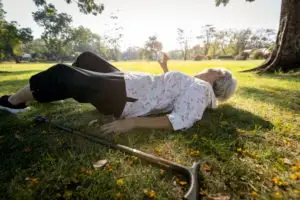
To file a slip and fall claim, you should collect evidence such as photos or videos of the accident scene highlighting any unsafe conditions, security camera footage if available, and witness statements. Medical records that document your injuries, any communication with the property about the hazard, and a record of your financial losses are also essential.
If you are injured in a slip and fall accident on someone else’s property, and your injury is fairly serious, it can have a long-term impact on your life. In this case, you may be entitled to compensation for your losses, but in order to do so, you will need to establish that the property owner was negligent, and you will need to provide evidence.
Most of this evidence will need to be collected almost immediately after the slip and fall accident has occurred, and it will need to be reliable and strong enough to support your claim. An experienced personal injury lawyer from The Law Place can help you gather the evidence you need to file a lawsuit. For more information about how we can help you build your personal injury case, call us today for a free consultation. Our telephone number is (941) 444-4444, and our phone lines are open 24 hours a day, 7 days a week.
Evidence Needed in a Slip and Fall Case
Florida law has certain evidentiary standards that an injury victim must meet in order to hold a property owner liable for injuries sustained in a slip and fall accident.
Types of Evidence
As soon as the accident has occurred, you should think about gathering the following types of evidence:
- Photographs – Hazards are usually cleaned up straight after an accident has occurred, or hazard signs are put in place afterward, so you should use your smartphone to take pictures of the cause of your slip and fall before this evidence is lost. You should also take photos of your injuries.
- Witness Details – A business owner will often have their own version of events, and therefore unbiased witnesses can be crucial. Ask for their name and contact number so they can be contacted at a later date.
- Medical Records – Medical records are essential to prove the extent of your injuries and link them directly to the incident.
- CCTV – Most private premises will have CCTV cameras that may have captured the incident. Make a note of any cameras you can see and ask for a copy of the footage if you can.
- Incident Reports – Places like restaurants and theme-parks will be required to fill out an incident report, ask for a copy for your own records.
- Medial Records – You should seek medical attention even if you think you can manage without and keep a copy of all of the medical reports and medical bills.
- Keep a Detailed Diary – Keep notes of your travel expenses, lost time from work, day-to-day pain and suffering, any correspondence you have with the relevant parties, all of which will help to build your slip and fall claim.
How the Evidence Is Used
Your personal injury will use the evidence you have gathered, as well as any they are able to gather on your behalf, in order to build your slip and fall case. The evidence gathered may show that:
- The property owner was given actual or constructive notice of the dangerous hazard.
- The dangerous condition was foreseeable because it was a regular occurrence.
- How much time the property owner had to become aware of the unsafe condition and resolve it.
- That the hazard could have been reasonably controlled, e.g., it was not caused by bad weather.
- That there were no proper health and safety procedures in place that could have identified and fixed the hazard.
- The property owner could have reasonably prevented the slip and fall accident, e.g., they could have put up a hazard sign.

Why Is Evidence in a Slip and Fall Case So Important?
Even though many individuals have genuine claims for compensation following a slip and fall accident, there are a number of people who will try and play the system for their own personal benefit. For this reason, plaintiffs are given the burden of presenting specific evidence that supports their claim. This evidence must show that the defendant is liable for the slip and fall accident that caused your accident and that you were not in any way negligent yourself.
For example, did you personally cause the hazard that led to your fall? The courts in Florida must set this standard to protect property owners from false accusations and expensive lawsuits. Without evidence, it is unlikely that the court will award you with a personal injury settlement, and this is why it can be so crucial to seek the help of a lawyer that can find this evidence for you.
 We’re here to serve you. Our phones are open 24 hours a day.
We’re here to serve you. Our phones are open 24 hours a day. Common Injuries in a Slip and Fall Case
Slip and fall accidents will often result in fairly minor injuries that do not usually require medical treatment, such as cuts and bruises. However, unfortunately, some slip and fall victims sustain very serious injuries that can impact their life for years to come. Some examples of common slip and fall injuries include:
- Soft tissue injuries.
- Broken bones.
- Traumatic brain injuries.
- Concussion.
- Hip fractures.
- Sprained ankles and/or wrists.
- Abrasions.
- Back and spinal cord injuries.
- Neck and shoulder injuries.
- Knee damage.
These kinds of injuries will most likely result in expensive, ongoing medical bills, and long-term pain and suffering. If you’ve been injured in a slip and fall accident on someone else’s property, you should speak to an experienced slip and fall attorney as soon as possible.
 We’re Florida’s top litigation team with over 75 years of combined experience
We’re Florida’s top litigation team with over 75 years of combined experience Florida’s Premises Liability Laws
You do not automatically have rights when you are injured on another person’s property. This is because property owners have different legal duties to visitors, depending on their status on the property at the time of the slip and fall accident. The State of Florida splits these visitors into four main categories:
Invitees
Business or social invitees includes anyone who is on the premises because they were specifically invited or for the purpose of doing business. According to Florida’s premises liability laws, invitees are owed the highest duty of care. The property owner or person who controls the property has a legal duty to keep the premises safe and repair any potential hazards to avoid slip and fall accidents.
Licensees
According to Florida premises liability laws, a licensee is a person that is permitted on a property but not for business purposes. For example, a plus-one at a party who is considered welcome by the host. Licenses should be warned of any known dangers on the property, but the property owner is not required to make the property safe for them.
Trespassers
Trespassers are those who are not invited onto the property and could be there illegally. This could be a burglar that breaks into someone’s home and injuries themself in the process. These individuals don’t have many legal rights. However, the property owner cannot willfully or wantonly injure them by setting traps, for example.
Child Trespassers
Young child trespassers are treated a little differently than adult trespassers. Property owners owe a certain duty of care if there is something on their property that children are attracted to, such as a pool. This is known as an “attractive nuisance,” and the property owner should reasonably know that it may draw young children onto their premises. Therefore, they have a duty to safely block off any dangers to avoid accidents.
All slip and fall accident victims will be required to present evidence to the court to show what kind of guest they were, and this could drastically affect your slip and fall case. For example, if you went into a coffee shop to use the bathroom and not to eat or drink, you may be considered a licensee and not a business invitee, and your rights will be different. A slip and fall accident lawyer can help you understand how your status on the property will affect your claim during a free consultation.
 From the initial call to updates on your case status, we are here to get you answers.
From the initial call to updates on your case status, we are here to get you answers. Florida’s Comparative Negligence Laws
Evidence works both ways in premises liability cases. As a victim, you will be expected to present evidence that proves you were not in any way negligent. If it can be shown that you played a part in your own accident, you will not be awarded the maximum compensation possible for your injuries. This is due to Florida’s comparative negligence policy, which dictates that a possible settlement is reduced based on your contribution to the slip and fall accident.
According to Florida Statute 768.81, “contributory fault chargeable to the claimant diminishes proportionately the amount awarded”, in other words, your settlement is reduced according to your percentage of fault. Say you are awarded $100,000 for your injuries, but the jury found that you were 30% at fault for the slip and fall because you would have clearly seen the exposed wires if you had you looked down, you would receive $70,000, due to a 30% reduction of your award. If you are found to be more than 50% at fault, you will not be able to claim anything.
Damages in a Slip and Fall Accident Case
A slip and fall accident victim can make a claim for all costs and losses directly associated with the incident. This can include special damages, general damages, and punitive damages.
Special Damages
Special damages are probably the most straightforward types of damages in a slip and fall case. They are directly related to all of the victim’s actual losses, for example, medical expenses, the cost of rehabilitation, loss of earnings (due to recovery time missed from work), pain and suffering, and property damage. This is why it is so important to keep a record of all expenses that are related to your slip and fall injury.
General Damages
General damages are not as simple to determine because they concern any future losses. This could be for the loss of any future earnings, loss of amenity, loss of consortium, inability to complete basic household tasks, a loss of any future career opportunities and promotions. In addition, victims may suffer from anxiety and mental distress that is likely to continue into the future.
Punitive Damages
Punitive damages are quite different from the usual form of damages because they are intended to punish the defendant in order to encourage them to avoid making the same mistake in the future. Punitive damages are rare. Victims can only recover them if a defendant’s actions or inactions were especially dangerous or showed they had a reckless and wanton disregard for the safety of others.
The Importance of a Personal Injury Lawyer for a Slip and Fall Claim
Collecting evidence for a personal injury case and putting it together to present to a judge and jury is no simple task. To give yourself the best shot at securing a reasonable settlement following a slip and fall accident, you should seek legal support. A personal injury lawyer can conduct their own investigation into the incident, interview witnesses, and gather evidence that you might not be able to get yourself.
They will have the experience required to establish that a property owner was negligent and therefore liable for your injuries using the available evidence. Furthermore, it is unlikely that you will have any idea of how much compensation you are entitled to, and you may be pushed into accepting a settlement that is much lower than you deserve. An attorney can ensure that you are not taken advantage of and are awarded fair compensation for your losses following a slip and fall accident.
What Evidence Do I Need to File a Slip and Fall Claim?
What constitutes a slip and fall lawsuit?
A slip and fall lawsuit arises when someone is hurt due to a hazardous condition on someone else’s property. These incidents often result in painful injuries, and the victim may seek compensation from the property owner.
What initial evidence should I collect if a fall occurred on someone else’s property?
After a fall, it’s important to document everything. If security camera footage is available, it can provide clear evidence of how and where the fall occurred. Photographs of the area, especially if there was an uneven surface or any unsafe conditions, are crucial.
What are common hazardous conditions that lead to falls?
Common hazardous conditions include wet floors, uneven surfaces, poorly lit areas, and clutter that obstructs walkways. If these conditions caused your fall, they could form the basis of your claim.
How do I prove the property owner failed to maintain safe conditions?
To prove that the property owner failed to maintain safe conditions, you need evidence that the hazardous condition was known, or should have been known, and that the owner did nothing to rectify it. Witness statements and maintenance records can support this.
What role do employees play in proving a slip and fall claim?
Employees’ actions are pivotal. If employees were aware of the danger and failed to act, or if their negligence created the unsafe conditions, this can significantly support your claim. Employee statements or incident reports can serve as evidence.
How do I document other losses related to my slip and fall?
Documenting other losses involves keeping detailed records of medical expenses, lost wages, and other financial impacts resulting from the injury. A detailed journal describing your daily pain levels and the emotional impact of your injuries can also be helpful.
Why is it beneficial to work with a law firm when filing a slip and fall claim?
Working with a law firm can provide guidance through the complexities of slip and fall lawsuits. They can help gather and present evidence, negotiate with insurance companies, and if necessary, represent you in court to ensure you receive fair compensation for your injuries and other losses.
Call The Law Place Today
If you have questions about what evidence you need for a slip and fall claim, The Law Place can help. During a free consultation, we can review the facts of your case and tell you your options.
If you choose to work with us, our team of experienced personal injury lawyers can help you to build the evidence you need to secure a compensation settlement. We work on a no-win, no-fee basis, so you have nothing to loose by reaching out for help.
Call us today at (941) 444-4444 to find out more.



